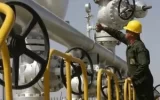Reducing the import of Russian gas and extending the contract with Iran

According to the exclusive report of Energy Press; The security of a country includes many components, among which energy security plays a special role. The level of development and security of the energy sector largely determines the economic, social and defense aspects of the state. The availability of a country’s natural energy resources (especially oil and gas) and technologies (green energy production, nuclear energy, processing plants) naturally creates both competitive advantages and a sufficient level of energy security and independence. On the other hand, lack of suitable resources and underdevelopment of industrial technologies lead to strong dependence on foreign suppliers.
In this regard, an import-dependent government in its energy policy tries to minimize the monopoly of a foreign agent, eliminate the complete dominance of one supplier in the national market and weaken the existing dependence by other suppliers. Such a policy is not new in global practice and is usually aimed at taking into account global market conditions and geopolitical processes.
Due to its geographical location and the level of scientific and technological development, Turkey does not have sufficient natural resources of oil and gas, nor does it have high industrial technology. For objective reasons, Ankara must meet its energy needs mainly by importing gas from a number of countries.
At the beginning of the 21st century, with the implementation of large energy projects supported mainly by the United States and the United Kingdom, Azerbaijan’s oil and gas resources are exported to European Union countries by bypassing Russia through Turkey. Therefore, Turkey became a key transit hub and naturally had a positive impact on the energy security of the Turkish government. The fact is that Turkey is not only a communication route for the transit of oil and gas from the Caspian Sea to Europe, but also receives this type of strategic raw materials at reasonable prices, for example, from Azerbaijan.
However, the volume of Azerbaijan’s gas exports is not enough to meet all the energy needs of Turkey’s growing economy. This is why Turkey has been very successful in energy development in addition to energy connections from Azerbaijan (especially the Baku-Tbilisi-Erzum gas pipeline, the Trans-Anatolian gas pipeline and the Baku-Tbilisi-Ceyhan oil pipeline).
Also, Turkey’s partnership with Russia within the framework of this pragmatic policy has led to a number of existing and prospective large projects in the energy sector, especially the Blue Stream and Turkish Stream gas pipelines, the Akkoyo power plant. Although Ankara imports gas from a number of other countries, notably through the pipeline from Iran, and LNG from Algeria, France, Egypt, Brazil, Kazakhstan, Nigeria and the United States, Russia remains the main foreign gas supplier.
Reducing dependence on Russia
For example, in 2022, Russia exported 21.5 billion cubic meters of gas to Turkey through the Turkish Stream and Blue Stream pipelines, while at the end of 2023, this type of Russian export to Turkey reached the level of 15 billion cubic meters of gas. , decreased almost to the level of 2019. For comparison, Azerbaijan exported 10 billion and 257.22 million cubic meters of gas from the Shah Deniz field to Turkey in 2023, which is 17.8% more than in 2022.
In 2023, Russia remained Türkiye’s main gas and oil supplier. According to the report of the Turkish newspaper Hurriyet in October 2023, 49.93% of Turkey’s oil imports are from Russia, while this figure was 40.74% of oil in 2022. Thanks to the increase in the supply of oil and oil products from Russia, Turkey saved about 2 billion dollars in 2023. Russia was also the main exporter of natural gas to Türkiye in 2023. In October 2023, it accounted for 59.14% of Türkiye’s imports. At the same time, Moscow resolved issues related to deferred payments with Ankara, which had a positive effect on solving Turkey’s economic problems. For example, Turkey delayed payment of $600 million worth of Russian gas until 2024 due to rising energy prices. .
But in 2023, Russia lost its leadership as a gas exporter to Turkey and eventually came third. Algeria and the United States were Türkiye’s main gas suppliers. In particular, Algeria exported 1.8 million tons of gas worth $1 billion and the United States 1.1 million tons of gas worth $628 million.
In 2023, Turkey began producing natural gas from the Sakarya field in the Black Sea, which the Turks plan will allow them to meet the needs of the domestic market and reduce natural gas imports for the foreseeable future. However, it is still too early to talk about commercial volumes and a fully established process of production and distribution of gas from the field.
During the 2023 presidential campaign, Recep Erdogan’s main challenger, Kemal Kilicdaroglu, leader of the pro-American Republican People’s Party (RPP), accused him of making Turkey completely dependent on Russian oil and gas through his energy policy. According to the Turkish opposition, a similar strategic partnership with Russia could apparently lead to Turkey’s heavy dependence not only in energy and economy in general, but also in politics and security.
- Comments sent by you will be published after approval by site administrators.
- Comments that contain slander will not be published.
- Comments that are not in Persian or not related to the news will not be published.

Comments
Total comments : 0 Awaiting review : 0 Date: 0